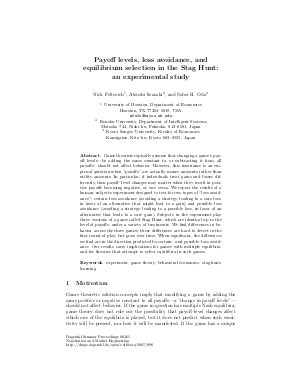Payoff levels, loss avoidance, and equilibrium selection in the Stag Hunt: an experimental study
Authors Nicholas Feltovich, Atsushi Iwasaki, Sobei H. Oda
-
Part of:
Volume:
Dagstuhl Seminar Proceedings, Volume 6461
Part of: Series: Dagstuhl Seminar Proceedings (DagSemProc) - License:
 Creative Commons Attribution 4.0 International license
Creative Commons Attribution 4.0 International license
- Publication Date: 2007-05-10
File

PDF
DagSemProc.06461.19.pdf
- Filesize: 83 kB
- 6 pages
Document Identifiers
Subject Classification
Keywords
- Experiment
- game theory
- behavioral economics
- stag hunt
- learning
Metrics
- Access Statistics
-
Total Accesses (updated on a weekly basis)
0Document
0Metadata
Abstract
Game theorists typically assume that changing a game's payoff levels--by adding the same constant to, or subtracting it from, all payoffs--should not affect behavior. However, this invariance is an empirical question when "payoffs" are actually money amounts rather than utility amounts. In particular, if individuals treat gains and losses differently, then payoff-level changes may matter when they result in positive payoffs becoming negative, or vice versa. We report the results of a human-subjects experiment designed to test for two types of "loss avoidance": certain-loss avoidance (avoiding a strategy leading to a sure loss, in favor of an alternative that might lead to a gain) and possible-loss avoidance (avoiding a strategy leading to a possible loss, in favor of an alternative that leads to a sure gain). Subjects in the experiment play three versions of a game called Stag Hunt, which are identical up to the level of payoffs, under a variety of treatments. We find differences in behavior across the three games; these differences are hard to detect in the first round of play, but grow over time. When significant, the differences we find are in the direction predicted by certain- and possible-loss avoidance. Our results carry implications for games with multiple equilibria, and for theories that attempt to select equilibria in such games.
Cite As Get BibTex
Nicholas Feltovich, Atsushi Iwasaki, and Sobei H. Oda. Payoff levels, loss avoidance, and equilibrium selection in the Stag Hunt: an experimental study. In Negotiation and Market Engineering. Dagstuhl Seminar Proceedings, Volume 6461, pp. 1-6, Schloss Dagstuhl – Leibniz-Zentrum für Informatik (2007)
https://doi.org/10.4230/DagSemProc.06461.19
BibTex
@InProceedings{feltovich_et_al:DagSemProc.06461.19,
author = {Feltovich, Nicholas and Iwasaki, Atsushi and Oda, Sobei H.},
title = {{Payoff levels, loss avoidance, and equilibrium selection in the Stag Hunt: an experimental study}},
booktitle = {Negotiation and Market Engineering},
pages = {1--6},
series = {Dagstuhl Seminar Proceedings (DagSemProc)},
ISSN = {1862-4405},
year = {2007},
volume = {6461},
editor = {Nick Jennings and Gregory Kersten and Axel Ockenfels and Christof Weinhardt},
publisher = {Schloss Dagstuhl -- Leibniz-Zentrum f{\"u}r Informatik},
address = {Dagstuhl, Germany},
URL = {https://drops.dagstuhl.de/entities/document/10.4230/DagSemProc.06461.19},
URN = {urn:nbn:de:0030-drops-9960},
doi = {10.4230/DagSemProc.06461.19},
annote = {Keywords: Experiment, game theory, behavioral economics, stag hunt, learning}
}
